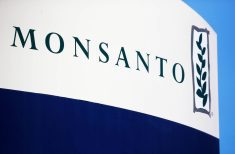The biotechnology industry should develop a format to handle the looming expiration of patents on the first wave of genetically modified (GM) crops, to avoid seed shortages or trade disruptions, the largest U.S. farm group said.
“There just needs to be a way to deal with it,” Rosemarie Watkins of the six-million-member American Farm Bureau Federation said on Thursday. Patents will expire in coming years on two dozen genetically modified seed varieties. The first, in 2014, will be the herbicide-tolerant Roundup Ready soybeans developed by Monsanto Co. and used by most U.S. soybean farmers.
Read Also

Manitoba John Deere dealers plan merger
Two retail dealership chains handling John Deere farm equipment in Manitoba say they plan to merge, bringing 13 locations under one organizational umbrella.
Some grower and seed groups have asked if generic versions of the seeds will be available in time and if other nations will accept the crops. Half of U.S. soybeans are exported, for example, so rejection could be price disaster for growers.
Foreign approval is held by the company that owns the patent. The transition from patented to generic seed is not certain either at home or abroad, say some farm and seed groups.
Delegates amended AFBF policy during a meeting in Atlanta on Tuesday to say, “We favour an industry-developed protocol for biotech crops before coming off patent.” The change was proposed by Phil Nelson, president of the Illinois Farm Bureau, and approved, 207-114.
One opponent said the language amounted to taking sides in a potential lawsuit between Monsanto, the No. 1 seed company, and DuPont, owner of rival Pioneer Hi-Bred.
“We welcome the Farm Bureau resolution as it recognizes the industry’s efforts,” said a spokeswoman for the Biotechnology Industry Organization, a trade group. Monsanto had no comment.
BIO has a post-patent task force at work on development of an industry accord. Task force principles include maintenance of export approvals and fair treatment of intellectual property.
Monsanto said last summer it would maintain export approval status for Roundup Ready soybeans through 2021, four years longer than it pledged initially. A farm group, the American Soybean Association, said private and public sector breeders should be allowed to work on the trait before it expires.
Monsanto says seed breeders and seed companies will be in position to put a generic version of Roundup Ready soybeans on the market in 2015.
DuPont has accused Monsanto of trying to control the seed market by limiting availability of its Roundup Ready gene. Monsanto has a new, patented “Roundup Ready 2 Yield” genetic trait entering the marketplace.
When the patent expires, growers can save some of their soybeans as seed for next year’s crop, rather than having to pay Monsanto for the right to plant it. However, they may not be able to access any seed.
















